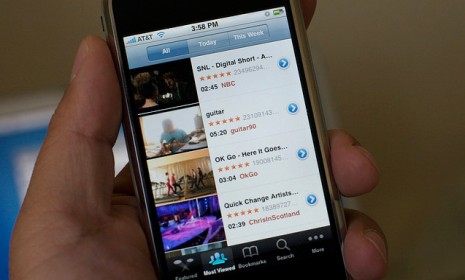3 reasons the iPhone is ditching YouTube
When iOS 6 comes out in September, eager YouTubers will no longer see the built-in video app on their Apple devices. What's behind the divorce?

A free daily email with the biggest news stories of the day – and the best features from TheWeek.com
You are now subscribed
Your newsletter sign-up was successful
For years, anyone with an iPhone has been able to watch the latest viral video without opening a web browser, thanks to a built-in app. No more: Starting this fall when iOS 6 is released, the native YouTube app that's been bundled with every release of the iPhone and subsequent update since 2007 will disappear from a potentially more spacious homescreen. In a statement released by Apple, the tech giant says its "license to include the YouTube app in iOS has ended," and that customers will still be able to access the streaming video player with Safari. For its part, Google (which owns YouTube) says it's making a new dedicated YouTube app you'll be able to download at the App Store. Why is Apple choosing not to renew the deal? Here, three theories:
1. It's part of Apple's ongoing de-Googlefication
Back in 2007 when the iPhone was first introduced to the masses, Google's Eric Schmidt was still on Apple's board of directors, Android hadn't launched yet, and Steve Jobs wasn't talking about going "thermonuclear," says Peter Kafka at All Things D. "And since then, of course, things have changed," and the two companies have been bitter rivals ever since. "Apple and Google don't exactly like each other," says Ben Parr at CNET, "and Apple has been systematically purging Google's influence from its flagship OS." Earlier this year, for example, the company announced that iOS 6 will jettison the standard Google Maps app in favor of Apple Maps. Still, here's the bright side: "Now that Google is in charge of the YouTube app again, I suspect it will become a lot faster, smarter, and feature-rich."
The Week
Escape your echo chamber. Get the facts behind the news, plus analysis from multiple perspectives.

Sign up for The Week's Free Newsletters
From our morning news briefing to a weekly Good News Newsletter, get the best of The Week delivered directly to your inbox.
From our morning news briefing to a weekly Good News Newsletter, get the best of The Week delivered directly to your inbox.
2. The YouTube app was originally an assault on Flash video
When the iPhone was first revealed, Steve Jobs considered Flash (and Flash video) the scourge of the internet, and did everything in his power to eliminate its presence on the web, says Matthew Panzarino at The Next Web. "The native YouTube app was an effort to legitimize HTML5-compatible video [instead]." Apple was able to leverage its control over YouTube to tip the scale in HTML5's favor, which turned out to be a "huge factor in the sidelining of Flash video." Now that HTML5 is the standard, Apple doesn't need a native YouTube presence built into its devices. In short, it won the war.
3. Google actually wanted this too
In all honesty, the iPhone YouTube app has always been "a weird bit of corporate compromise" on Google's part, says All Things D's Kafka. For one thing, it's never been able to deliver advertising; now that Google will control the app, they'll finally be able to "monetize millions of mobile eyeballs and cat videos." Plus, with the iPhone version of the app, YouTubers can only access limited content; in theory this divorce will let Google open up its whole archive. This is "the best thing that could've happened for Apple, for Google, and most of all for you," says Brian Barrett at Gizmodo. Both are "ending a loveless marriage. Now both parties can go off and find their own happiness."
A free daily email with the biggest news stories of the day – and the best features from TheWeek.com
-
 Quentin Deranque: a student’s death energizes the French far right
Quentin Deranque: a student’s death energizes the French far rightIN THE SPOTLIGHT Reactions to the violent killing of an ultra-conservative activist offer a glimpse at the culture wars roiling France ahead of next year’s elections.
-
 Secured vs. unsecured loans: how do they differ and which is better?
Secured vs. unsecured loans: how do they differ and which is better?the explainer They are distinguished by the level of risk and the inclusion of collateral
-
 ‘States that set ambitious climate targets are already feeling the tension’
‘States that set ambitious climate targets are already feeling the tension’Instant Opinion Opinion, comment and editorials of the day